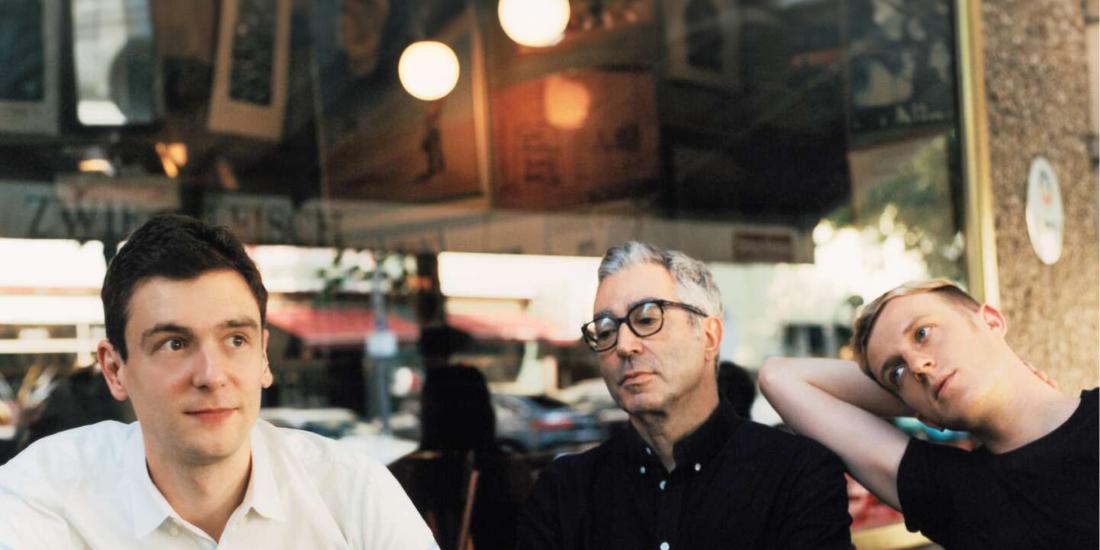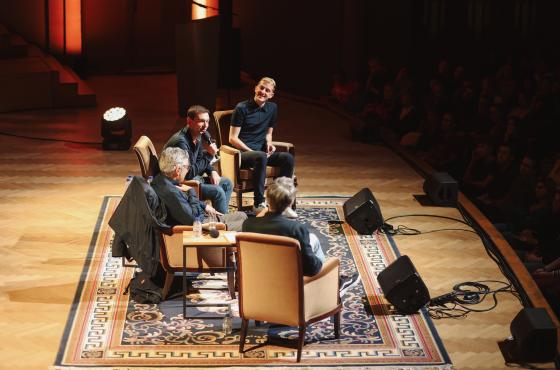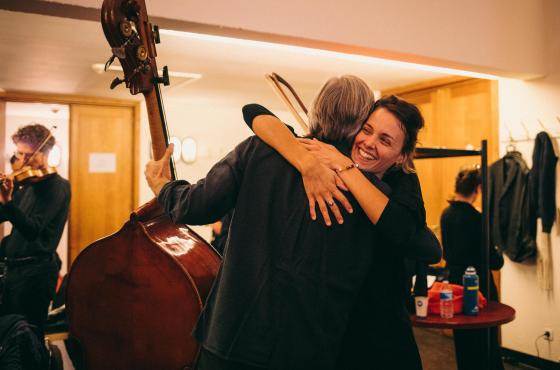Should you decide to go on Instagram on 24 December – to distract yourself from a gruesome family discussion for example – you will find that Geoffroy de Lagasnerie, Didier Eribon and Édouard Louis spend Christmas Eve together. You may even feel a tinge of jealousy. They dodge the traditional family circle and revel in their three-way friendship. A friendship that dates back to 2011. A friendship paced by writing.
“We wrote the books we wrote because this relationship exists,” confided Geoffroy de Lagasnerie in 2023 in 3 – a book that explores (and celebrates) friendship as a way of life. So yes, they all take friendship extremely seriously. From sunrise to sunset. Or, more precisely, from noon to the middle of the night. (They willingly admit they are not morning people.)
Friendship as a hyphen
“We have to see our friends as priorities that take precedence over all others,” explains De Lagasnerie, using the term ‘ethos of availability’. This ethos is more than a theoretical concept; it is a continuous process. The youngest of the three, Édouard Louis, illustrates this friendship in his latest book, Monique s’évade. When the young writer advises his mother from Athens to immediately leave the violent alcoholic she is living with in Paris, Didier is there. He is there - “naturally, of course” - to help Monique escape. He also has the words to comfort Édouard Louis’ mother: “You’re brave. It’s always difficult to escape. I admire you.”
Didier is, in fact, the renowned sociologist and philosopher Didier Eribon, who wrote the acclaimed Retour à Reims. The fact that I’ve decided to write ‘Didier’ without adding his surname is by no means a sign of disrespect or familiarity – I wouldn’t dare! It simply echoes their friendship. Didier, Édouard, Geoffroy: three first names that pop up in their books and social media posts.
They mention each other by name. They quote each other. Their friendship exists.
This friendship is no fabrication. I’ve seen it. In real life. In a gesture. In a few words. Édouard and Geoffroy – you will have understood by now why I don’t add their second names – were my guests on a radio show (Dans quel Monde on vit, La Première, RTBF, 2018). Geoffroy talked quickly, scarcely pausing. He’s not easy to keep up with. Édouard noticed this and gently raised his hand towards Geoffroy, in the same way as an orchestra conductor. The tempo dropped; Geoffroy’s thoughts became clearer. When they left the studio, we took one photo. And before I knew it, they were typing on their phones. I heard them utter the third name. Didier wanted to know how it went.
The collective ‘I’
So, this friendship is not a fiction. Moreover, these three don’t travel in the realm of fiction. They all capture reality in their writings. They express it, fight it, emphasise it or use it as a concept. Each with their individual approach, style, experience, emotion, ... But never without interacting with the other two. Between them, the ‘I’ becomes a ‘we’. In their texts, the ‘I’ becomes plural, collective. It is there to serve others. The three friends want to help people overcome their powerlessness. (“If I had to use one word to characterise the current political situation and our experience of it, I would use the concept of powerlessness”, according to De Lagasnerie.) Their act of writing is a political act. A process of unravelling systems of domination.
All three have a keen interest in sociology. Didier Eribon was even a close friend of Pierre Bourdieu - he described his meeting with the sociologist in 1979 as ‘friendship at first sight’. (Friendship is, clearly, never far away.) Bourdieu, by the way, is the guy who demonstrated that our social position determines our tastes and lifestyles. As such, they are not a matter of personal choice.
The first book Édouard Louis published, at the age of 21, was devoted to Pierre Bourdieu: L’insoumission en héritage (A Legacy of Insubordination). Incidentally, the title of Geoffroy de Lagasnerie’s first book is L’Empire de l’université. Sur Bourdieu, les intellectuels et le journalisme (The Empire of the University. On Bourdieu, intellectuals and journalism).
The three writers strive to overcome the permanent psychologization of human actions. What we go through is not a personal matter. “We must never, as Adorno says, mistake what we are for what society has made of us,” writes De Lagasnerie in 3. And you should definitely also read Didier Eribon’s thoughts on psychoanalysis, which he dismisses as sad and arrogant. Like in his 2013 essay La société comme verdict (The Verdict of Society). The sheer lucidity of his message transpires from the back cover: “Society allocates positions. It passes verdicts that imprison us and scar our lives forever. Society draws boundaries and hierarchies between individuals and groups.” In short, the three suggest that we should rummage into the toolbox – and concepts – of sociology to find the best answer to that daunting question, “Who am I?”
Political Battle
But so, who are they? Besides (or because of) their friendship? If sociology provides the answer, we could say that Didier and Édouard are class defectors. That they have broken away from their assigned place in society. Ten years ago, in En finir avec Eddy Bellegueule (Away with Eddy Bellegueule), Édouard Louis described his survival in a village in the north of France where he spent the first years of his life, and where he was subjected to terrible homophobic bullying. He ran away. He had no choice. He was in danger.
“Shifting from one class to another isn’t about betrayal, it’s about survival,” as he recently explained in Libération. It was when he read Didier Eribon’s Retour à Reims that he realised what was going on inside him – the feeling of shame, in particular. In this book, the sociologist (born in 1953) recounts the working-class world in which he grew up. His family. And his own journey as a class defector. Retour à Reims is a benchmark on the subject. As in Louis’ writings, intimacy and sociology intermingle and unfold.
Born in 1981 into a much more privileged background, Geoffroy de Lagasnerie never dwells on his family life, but devotes part of his work to the ruled masses. For instance, he co-wrote Le Combat Adama (The Adama Fight) with Assa Traoré, sister of Adama Traoré, a 24-year-old Frenchman who died after being arrested and beaten by three policemen. In it, De Lagasnerie explores the phenomenon of police violence in working-class neighbourhoods and tries to understand why young boys run away from the police: “Running away is the political expression of a relationship with institutions and a result of the way they work, which is threatening or perceived as such.”
The escape, the flights, those of Adama, Monique, Édouard, Didier. Notice how their texts resonate with each other. The escape, and then finding a haven in friendship. One that is particularly open to others, beyond the self. Friendship that leads to action, to combat. As De Lagasnerie writes: “To leave the world in order to recompose it better, to bend it, to disorganise it: this could be, in a sense, the political formula of friendship as a fulfilled practical utopia.” What would your friends say about this?
Pascal Claude
On 17 September, at Bozar's request, the three friends will open the new season with a joint reading in the Henry Le Bœuf Hall.




